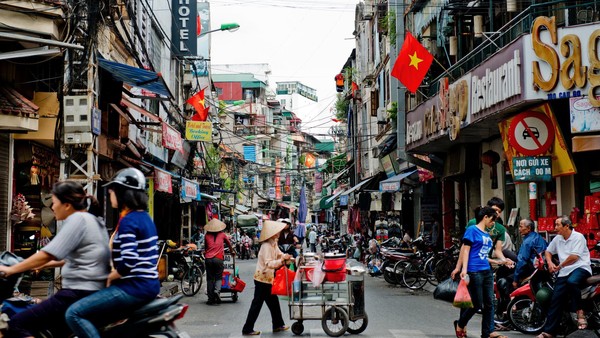(单词翻译:单击)
The tale of a Vietnamese transgender entrepreneur has become the country’s biggest film hit — and sparked domestic debate about whether it plays to stereotypes. But Let Hoi Decide has made waves for another reason: it is co-produced by CJ E&M, the South Korean leisure group, which has burrowed to the heart of the Vietnam market.
一位越南变性人企业家的故事成为该国最热门的电影,并在国内引发了有关该故事是否合乎常理的辩论。但《Let Hoi Decide》引起轰动还有一个原因:这部电影是越南与韩国娱乐集团CJ E&M共同打造的,CJ E&M已深入越南市场的核心。
CJ’s cinematic coup is part of a stream of Japanese and South Korean investment in the country, amid goodwill that contrasts with the troubled relationship between Hanoi and Beijing. While anti-Chinese rioters ransacked foreign companies in Vietnam last year after maritime skirmishes between the countries, Seoul and Tokyo were quietly brandishing hard money and soft power.
CJ E&M在电影上大获成功是日韩对越南众多投资的一部分,这种友好与中越之间的不睦形成对比。去年,在中越爆发海上冲突后,反华暴徒洗劫了在越南的外国企业,而日韩却在悄悄运用其硬通货和软实力的影响力。

Analysts say the push by the two east Asian economic leaders reflects a dovetailing of commercial and strategic interests that has a broader regional importance. While Hanoi wants to limit its dependence on Beijing, Japan and South Korea wish to tighten their embrace with the 10 countries of the Asean Southeast Asian grouping that are preparing — some say optimistically — to launch a single market of more than 500m people this year.
分析人士表示,这两个东亚经济领袖的举动反映出商业和战略利益的契合,会对地区产生更广泛的影响。越南希望限制其对中国的依赖,而日韩希望加强其对东南亚国家联盟(Asean,简称东盟)10国的接纳,一些人乐观地表示,今年东盟正准备启动包括逾5亿人的单一市场。
“In the past few years, most of the new foreign investment in Vietnam came from Korea and Japan,” said Nguyen Xuan Thanh, director of the Fulbright Economics Teaching Program in Ho Chi Minh City. “And that is for both business and geopolitical reasons.”
“过去几年,越南多数新外资来自韩国和日本,”胡志明市Fulbright Economics Teaching Program负责人Nguyen Xuan Thanh表示,“这既有商业原因,也有地缘战略原因。”
The advances are visible in trends ranging from the extraordinary expansion of Samsung Electronics to the Ho Chi Minh City banners proclaiming the Vietnam-Japan co-operation to build a landmark urban rail network.
这一进展十分明显,从三星电子(Samsung Electronics)非同寻常的扩张到胡志明市打出的横幅,称赞越南与日本合作修建地标性城市铁路网络。
Japan and South Korea are building on a long interest in a country notable for its cheap labour and 90m-strong consumer market. For Hanoi, there is a political imperative to draw more foreign investment because of structural economic problems such as bad debts and inefficient state companies, which have dragged Vietnam’s growth down from above 7 per cent a year before the financial crisis to 5.4 per cent in 2013.
在这个以廉价劳动力和9000多万消费者市场而闻名的国家,日本和韩国正在构建长远利益。对于越南而言,吸引更多外资有其政治必要性,因为该国存在着坏账和国企低效等结构性经济问题,这些问题将越南的经济增速从金融危机前的每年逾7%拉低至2013年的5.4%。
Fred Burke, a corporate lawyer in Ho Chi Minh City, said Vietnam looked “a lot like Thailand was 20 years ago” to Japanese and South Korean executives seeking a “long-term strategic partner they can work with”.
胡志明市公司律师弗雷德•伯克(Fred Burke)表示,对于寻求“能与之合作的长期战略合作伙伴”的日本和韩国高管而言,越南看上去“很像20年前的泰国”。
One manifestation of that is Vietnam’s emergence as the second-biggest recipient of Japanese official development assistance in 2013, after Myanmar. Loans and grants to Hanoi — many of them for infrastructure projects, such as the gleaming international terminal at the city’s commercial airport — totalled $1.3bn, according to the OECD group of mostly wealthy nations.
一种表现是,2013年越南成为日本官方开发援助的第二大接受国,仅次于缅甸。根据多数为富国的经合组织(OECD)的数据,提供给越南的贷款和拨款总计13亿美元,其中很多用于基础设施项目,例如河内商业机场光彩熠熠的国际航站楼。
Direct investment by Japanese businesses in Vietnam more than tripled to $9bn between 2011 and 2014, compared with the previous four years, according to the Japan External Trade Organisation. South Korean investment in Vietnam in 2013 and last year totalled $2.6bn, almost a third higher than in the previous two years.
根据日本贸易振兴机构(Japan External Trade Organisation)的数据,2011年至2014年,与之前4年相比,日本企业在越南的直接投资增长3倍多,至90亿美元。2013年和去年,韩国在越南的投资总额为26亿美元,几乎比之前两年高出三分之一。
Notable Japanese corporate entrants in Vietnam include Haseko, the property developer, which is to start building a $17m rental flat complex in Hanoi. Aeon, Japan and Asia’s biggest retailer, opened two shopping centres in Vietnam last year and has bought stakes in two large local supermarket chains.
进入越南的知名日本企业包括房地产开发商Haseko,该公司将投资1700万美元在河内建设一栋出租公寓楼。去年,日本及亚洲最大零售商永旺(Aeon)在越南开设了两家购物中心,并购入越南两家大型连锁超市的股权。
Leading the charge for South Korea is Samsung. The electronics company has taken advantage of tax and regulatory incentives to open two mobile phone assembly plants and has started building factories for display panels, home appliances and electrical parts.
在越南引领投资趋势的韩国企业是三星(Samsung)。这家电子集团利用税收和监管激励优势开办了两家手机组装厂,并开始建设显示屏、家电和电子配件工厂。
Vietnam is unlikely to escape the dependence in its complex relationship with China, in which cultural, political and trade ties chafe against conflicts ranging from a 1979 border war to last year’s high-seas spat. But the surge by South Korea and Japan is an early sign of how regional relationships are also being shaped by a focus on foreign investment and trade that may grow stronger still if the Asean single market ever becomes reality.
在与中国的复杂关系中,越南不太可能摆脱对中国的依赖,双方的文化、政治和贸易关系因各种冲突(从1979年的中越边境战争到去年的公海纷争)而变糟糕。但日韩的崛起是一个早期迹象,表明对外资和贸易的关注可能正影响着地区关系,如果东盟单一市场变成现实,这种关注可能会变得更为强烈。


